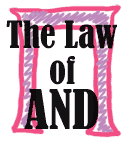And the Law of AND is ...
So, she has a 1/3 chance of guessing the right door, and if she gets the right door, she still has only a 3% chance of getting the tropical getaway. Overall, she has a 1% chance of actually finding that prize.
Door 1 no prize! |
Door 2 (3%) A tropical |
Door 3 no prize! |
How did we get this results? 3% × 1/3 = 1%.
In fact, the Law of AND states that when you want event 1 AND event 2 to occur, you need to MULTIPLY their individual probabilities, or
 P(E1
and E2) = P(E1) × (E2)
P(E1
and E2) = P(E1) × (E2)
 If in general the prize can be behind any of the three doors, and the
possible prizes are getaway (3%), washer (17%) and toaster (80%), what are
the contestant's chances of winning the toaster?
If in general the prize can be behind any of the three doors, and the
possible prizes are getaway (3%), washer (17%) and toaster (80%), what are
the contestant's chances of winning the toaster?
(To make this problem interactive, turn on javascript!)
- I need a hint ... : you need to find
P(door 1 is correct AND prize = toaster)
- ...another hint ... : P(door 1 is correct AND prize = toaster) =
P(door 1 is correct) × P(prize = toaster)
I think I have the answer: 0.33 × 0.80 = 0.27
Assume the conditions are exactly the same as above, except that 25% of the time the prize goes behind door 1, 25% behind door 2, and 50% behind door 3? If the contestant chooses door 1, what are her chances of winning the toaster?
(To make this problem interactive, turn on javascript!)
- I need a hint ... : door 1 is correct AND prize = toaster
- ...another hint ... : P(door 1 is correct) × P(prize = toaster)
I think I have the answer: 0.25 × 0.80 = 0.20
Copyright University of Maryland, 2007
You may link to this site for educational purposes.
Please do not copy without permission
requests/questions/feedback email: mathbench@umd.edu